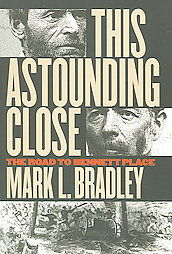Even after Lee surrendered to Grant at Appomattox, the Civil War continued to be fought, and surrenders negotiated, on different fronts. The most notable of these occurred at Bennett Place, near Durham, North Carolina, when Confederate General Joseph E. Johnston surrendered the Army of Tennessee to Union General William T. Sherman. In this first full-length examination of the end of the war in North Carolina, Mark Bradley traces the campaign leading up to Bennett Place.
Alternating between Union and Confederate points of view and drawing on his readings of primary sources, including numerous eyewitness accounts and the final muster rolls of the Army of Tennessee, Bradley depicts the action as it was experienced by the troops and the civilians in their path. He offers new information about the morale of the Army of Tennessee during its final confrontation with Sherman's much larger Union army. And he advances a fresh interpretation of Sherman's and Johnston's roles in the final negotiations for the surrender.
Mark L. Bradley is the author of the critically-acclaimed Last Stand in the Carolinas: The Battle of Bentonville, considered by many to be the definitive account of the largest Civil War land battle to take place here in our own home state. He has recently followed that effort up with This Astounding Close: The Road to Bennett Place, which takes us from the battle at Bentonville to the closing moments of the war for Sherman's and Johnston's armies, the surrender at Bennett Place. He has also written several articles for Blue & Gray Magazine and Civil War Regiments.
Mark is a past president (2000) and Program Chairman of the NC CWRT. He holds a B.A. in History from North Carolina State University, an M.A. in History from UNC-Chapel Hill, and a Doctorate in History from UNC-Chapel Hill. He recently accepted a position with the Center of Military History in Washington, DC.
|
"Bradley's book is readable, interesting, and informative."--Journal of American History
"A remarkable book which shows years of painstaking research and a talent to weave the essence of the situation into an easily read and followed story. . . . Serious scholars of the Civil War will find This Astounding Close a valuable study."--On Point
"Belongs on the shelf of every Civil War buff."--Blue & Gray Magazine
"A well-documented and careful analysis of the political and military situation within which Sherman and Johnston maneuvered and negotiated in the six weeks after Bentonville. It is an interesting story, told with considerable skill. . . . Bradley is to be commended for a well-written and impressively researched monograph on a long ignored subject."--Civil War History
"A superb study that incorporates the best of new military history."--Civil War Book Review
"Well-written, and covering a significant but neglected topic, this book is a worthy sequel to Bradley's earlier study of Bentonville."--North & South
"This volume sweeps aside a shelf of studies previously done on the end of hostilities in North Carolina. It is going to be a basic reference on the subject longer than the works it replaces. In addition, the book is a fascinating read."--Richmond Times Dispatch
"By casting his lens on the final days of the Army of Tennessee, [Bradley] sheds light on a neglected chapter of the Civil War story. . . . Thoroughly researched."--Our State
"[Bradley] paints a very different picture of the soldier known to his men as 'Uncle Billy.' . . . Even though we know the outcome of the story, Bradley manages to imbue his tale with moments of high drama. . . . Fascinating."--Durham Herald-Sun
"No one has ever placed the Sherman-Johnston surrender negotiations in their military context as thoroughly and clearly as has Mark Bradley. This pathbreaking book will long stand as the best account of the Civil War's final moments. It is must reading for anyone trying to understand the conclusion of the terrible conflict."--John F. Marszalek, Mississippi State University
"A fine piece of work that really helps us understand the last of the great, decisive western campaigns that began in 1861 in Kentucky and Missouri and ended in 1865 in North Carolina."--Richard M. McMurry, author of Two Great Rebel Armies
|

